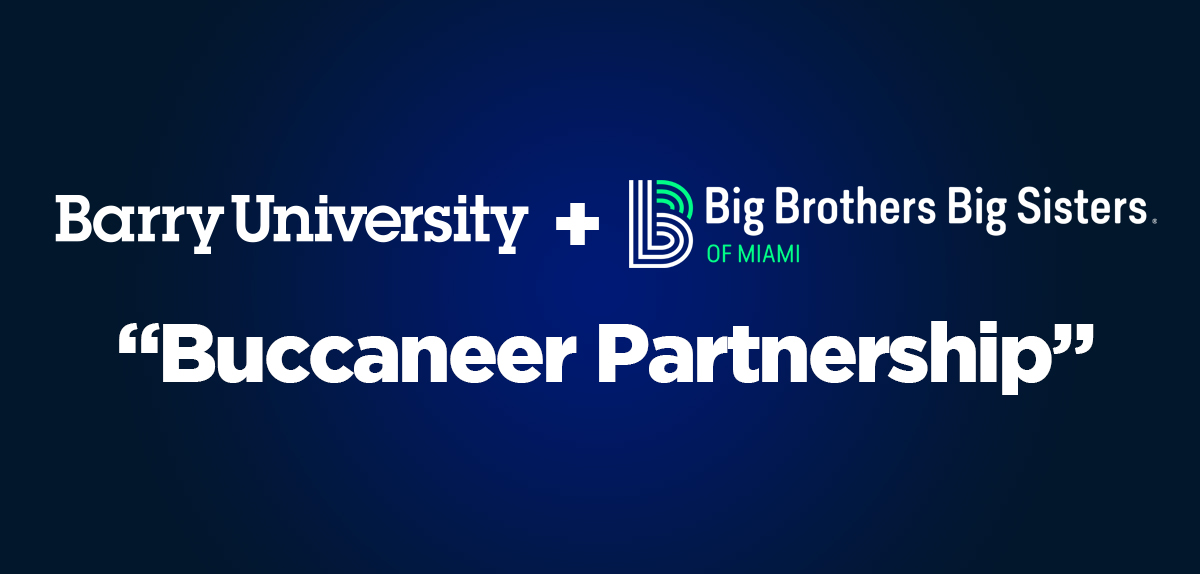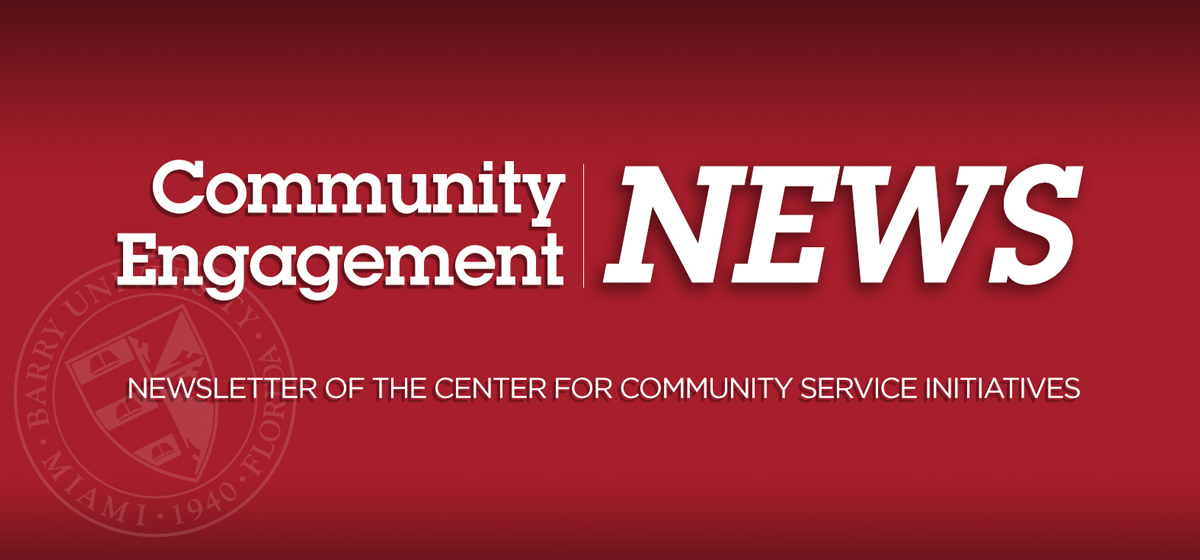March 8, 2021
IN THIS ISSUE
- Campus Compact Names Barry Senior Soné Keith a Newman Civic Fellow for 2021–2022
- Civic Learning Leader Caryn Musil to be Lead Presenter at Community Engagement Symposium
- Implementation of 2016–2021 Strategic Plan for Community Engagement Winding Down
- CCSI Representatives Participate in Bread for the World’s ‘Advocacy 101: Ending Hunger’

Campus Compact Names Barry Senior Soné Keith a Newman Civic Fellow for 2021–2022

Campus Compact has named Barry student Soné Keith among the Newman Civic Fellows for 2021–2022. She is one of 212 “community-committed students” receiving national recognition by being awarded the one-year fellowship.
A senior majoring in photography with a minor in education, Keith has focused her civic engagement on the work of the Peace Education Foundation, with emphasis on building peace-making skills among children.
In nominating her for the Newman Civic Fellowship, Barry University President Dr. Mike Allen noted that, over the past three years, Keith used her education and talents to promote peace and justice. She has done so as a Barry Service Corps member in the role of program assistant with the Peace Education Foundation in Miami.
“Soné has provided valuable assistance in the editing of a peace education curriculum and workbooks covering peace-making skill sets targeted to children,” President Allen said. “In addition, she has assisted with video productions of the Foundation’s mentoring series for teachers, which provides them with resources for preventing bullying and violence and for resolving conflicts at school. Combined with the work of others, Soné’s service is contributing to a decrease in disruptive behaviors and an increase in social connectedness in schools.”
The university president nominated Keith for Campus Compact’s Newman Civic Fellowship on the recommendation of the CCSI.
“The students selected for the fellowship are leaders on their campuses who demonstrate a commitment to finding solutions for challenges facing communities locally, nationally, and internationally,” according to a Campus Compact announcement. With support from the KPMG Foundation, Campus Compact offers the fellowship annually. The newly named fellows represent Campus Compact member colleges and universities from 39 states; Washington, D.C.; and Mexico.
Campus Compact is a Boston-based nonprofit organization working to advance the public purposes of higher education institutions by “deepening their ability to improve community life and to educate students for civic and social responsibility.” The fellowship was created in honor of Frank Newman, one of Campus Compact’s founders, described as “a tireless advocate for the role of higher education in preparing students for active and engaged citizenship.”
“The 2021 Newman Civic Fellows are an inspiring group of community-committed students who are already making an impact in communities where they live, learn, and serve,” said Dr. Andrew J. Seligsohn, president of Campus Compact. “We are pleased to acknowledge [these] emerging public problem solvers.”
The Newman Civic Fellows, including Soné Keith, are profiled at the Campus Compact website.
Civic Learning Leader Caryn Musil To Be Lead Presenter At Community Engagement Symposium
Four-Session Event Takes Place On March 31

Dr. Caryn McTighe Musil, a distinguished fellow with the Association of American Colleges and Universities (AAC&U), will be the lead presenter at Barry’s seventh annual Community Engagement Symposium on March 31.
Up to last year, Musil was AAC&U’s senior director of civic learning and democracy initiatives. Previously, for 14 years, she served as senior vice president of the association’s Office of Diversity, Equity, and Global Initiatives. Over three decades, she contributed to and directed national projects about diversity, democracy, global learning, civic engagement, women, and social responsibility.
The Community Engagement Symposium will be held virtually for the first time. It will consist of four sessions, the first beginning at 9 a.m. and the fourth ending at 3 p.m.
During Session I, Musil will lead a 75-minute workshop titled “Partnering on Purpose: How to Accelerate the Impact of Project-Based Experiential Learning.” Following two concurrent sessions, she will make an hour-long plenary presentation, “Acting on Purpose: Knowledge, Collaboration, and Social Responsibility.”
Now an independent consultant, Musil is the lead author of A Crucible Moment: Civic Learning and Democracy’s Future, a national report released at the White House in 2012. Calling for action to advance civic learning and democratic engagement “from niches to norms,” Crucible recommends that colleges invest in “robust, generative civic partnerships … to address common problems, empower people to act, strengthen communities and nations, and generate new frontiers of knowledge.”
AAC&U is the leading national association dedicated to advancing the vitality and public standing of liberal education by making quality and equity the foundations for excellence in undergraduate education in service to democracy.
Musil’s most recent initiative at AAC&U, Civic Prompts in the Major, aimed to embed designs for social responsibility, equity, and the public good within departmental majors as a dimension of disciplinary inquiry and practice.
In 2013, Musil received the Outstanding Contribution to Higher Education Award from NASPA—Student Affairs Administrators in Higher Education.
“Engagement in Purposeful Projects: From Awareness to Action” is the theme of the symposium. In relation to community engagement, purposeful projects include experiential learning practices such as service-learning, community-based research, fieldwork, study abroad, capstones, and internships.
Posters reflecting the “Purposeful Projects” theme will be a feature of the symposium, and undergraduates will compete for poster session prizes. All poster presenters—undergraduates, graduate students, and faculty/staff—will be recognized.
Implementation Of 2016–2021 Strategic Plan For Community Engagement Winding Down
The implementation of the university’s 2016–2021 strategic plan for community engagement is winding down. Titled “Creating Community Impact Through Experiential Learning and Engaged Scholarship,” the five-year plan has been implemented successfully.
Outcomes of the plan include a successful proposal to the Faculty Senate for community-engaged scholarship to be included explicitly in the university’s criteria for promotion; a comprehensive review of designated service-learning courses; the implementation of a Civic Action Plan; the development of a civic engagement course; and the replacement of the Community Engagement Management System.
Developed by the CCSI, the strategic plan was organized around six strategic goals, each with specific actions. The goals cover (1) civic/community engagement programs, projects, and events; (2) resources and services to advance community engagement; (3) university–community partnerships; (4) faculty professional development in service-learning, engaged scholarship, and other areas of community engagement; (5) student learning and development; and (6) public visibility and recognition of community engagement.
CCSI Representatives Participate In Bread For The World’s ‘Advocacy 101: Ending Hunger’





Barry participants in Bread for the World’s “Advocacy 101: Ending Hunger (College Edition)” were (from left) AmeriCorps VISTA member Kaitlyn Gallagher, Barry Service Corps members Javier Muñóz-Bracho and Amanda Gonzalez Garcia, and Experiential Learning Coordinator Liz James. Bread for the World is “a collective Christian voice urging our nation’s decision makers to end hunger at home and abroad.”
Barry’s collaborative work with Bread for the World over the past three years was highlighted during a webinar last month. Bread organized the hour-long webinar to promote advocacy as an approach to ending hunger.
CCSI-based AmeriCorps VISTA member Kaitlyn Gallagher and Experiential Learning Coordinator Liz James were guest presenters for the webinar. They gave an overview of hunger-focused and other advocacy projects coordinated by the CCSI.
Gallagher and James identified Bread’s Racial Wealth Gap Simulation as an excellent example of mutually beneficial collaboration. The simulation is “an interactive tool” that helps people to understand the connections among racial equity, hunger, poverty, and wealth.
As part of the webinar, Barry Service Corps members Javier Muñóz-Bracho and Amanda Gonzalez Garcia shared their experiences and insights. Muñóz-Bracho said, “By teaching students that they can’t solve the entire problem of hunger, but rather to take it one piece at a time … they can make a change.”
Bread for the World is described as “a collective Christian voice urging our nation’s decision makers to end hunger at home and abroad.” The organization declares: “We can end hunger in our time. But churches and charities can’t do it all. Our government must also do its part.”
Engaging people in organized advocacy, Bread equips them to write personal letters and emails, meet with their members of Congress, and work with others to address hunger. The “Advocacy 101: Ending Hunger (College Edition)” webinar on February 25 was aimed at providing Bread’s regional organizers and higher education institutions with tools and guidance to collaborate in support of ending hunger and reducing poverty.
College and university staff members and students attending the web-based seminar heard Gallagher and James explain that Barry’s work with Bread for the World has involved both curricular (service-learning) and co-curricular activities. Through Barry’s Campus Ministry, Gallagher noted, students have participated in Bread’s “Offering of Letters to Congress” for many years.
The Offering of Letters campaign engages colleges and universities, churches, and other faith communities in writing letters to Congress. Each year, Bread chooses “specific legislation or a legislative emphasis that can make a real difference to people struggling with hunger and poverty.” People write letters, usually as a group, and present them as an offering to God before mailing them to Congress.
Bread’s Lobby Days with federal-level lawmakers and the CCSI’s Deliberative Dialogue Series have provided students with opportunities for advocacy toward tackling food insecurity and alleviating poverty.

April 7
Noon–1:30


Contact Brittney Morales, Barry Service Corps program facilitator, at BriMorales@barry.edu.
VOTER FRIENDLY CAMPUS: This Tuesday (March 9), Campus Vote Project and NASPA—Student Affairs Administrators in Higher Education will announce the names of the colleges and universities newly designated as Voter Friendly Campuses, and Barry University is expected to be on the list. See next week’s Community Engagement News for a story on how Barry set goals for civic learning and democratic engagement (CLDE); expanded the CLDE coalition; and prepared, executed, and evaluated an action plan to earn the VFC designation.
COMMUNITY ENGAGEMENT SYMPOSIUM: Registration for Barry’s seventh annual Community Engagement Symposium on March 31 opens next week. The event will be held virtually via Zoom.


Apply to become a mentor (aka Big): https://bbbsmiami.org/volunteer/apply/

11300 NE 2nd Avenue
Adrian 208
Miami Shores, FL 33161

